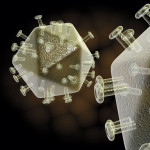In response to the persistent health challenges of herpes simplex virus 1 (HSV-1) and HSV-2, today [September 19] the National Institutes of Health released the Strategic Plan for Herpes Simplex Virus Research.
An NIH-wide HSV Working Group developed the plan, informed by feedback from more than 100 representatives of the research and advocacy communities and interested public stakeholders. The plan outlines an HSV research framework with four strategic priorities: improving fundamental knowledge of HSV biology, pathogenesis, and epidemiology; accelerating research to improve HSV diagnosis; improving strategies to treat HSV while seeking a curative therapeutic; and, advancing research to prevent HSV infection.
HSV-1 and HSV-2 are among the most common viral infections in the United States. HSV can cause recurring blisters or sores. In severe cases HSV may lead to life-threatening or long-term complications, typically in the central nervous system. There are no licensed preventive HSV vaccines, and there is no cure.
Up to 80% of people between the ages of 14 and 49 years in the United States live with HSV-1, and more than 10% live with HSV-2. HSV symptoms are primarily managed with antivirals that can reduce their frequency and intensity, but those medications do not clear the infection. Asymptomatic HSV is extremely common, and people who are asymptomatic can still transmit HSV to others. HSV is a leading cause of viral encephalitis—brain inflammation from a viral infection—and infectious blindness worldwide. Neonatal herpes, if left untreated, is fatal in 60% of cases.
The NIH HSV Working Group was established in October 2022 and consists of scientific and policy experts from the National Institute of Allergy and Infectious Diseases, the National Institute on Mental Health, the National Institute on Neurological Disorders and Stroke, the National Institute on Aging, the National Institute on Minority Health and Health Disparities, the Eunice Kennedy Shriver National Institute on Child Health and Human Development, and the National Eye Institute.
This plan aligns with ongoing national efforts, including the Sexually Transmitted Infections National Strategic Plan, and reflects broad public input, including individual experiences with HSV care, as well as the mental health impact of HSV social stigma. NIH anticipates that this plan will serve as a foundation for research, public health and medical communities to collaboratively work to reduce the burden of HSV-1 and HSV-2.
This news release was published by the National Institute of Allergy and Infectious Diseases on September 19, 2023.







Comments
Comments